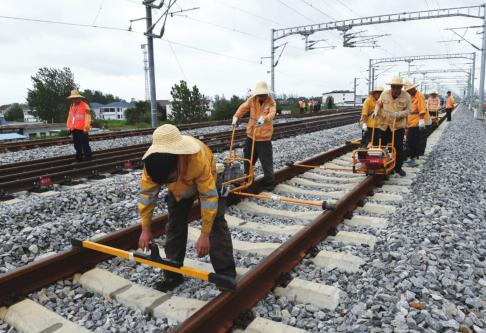Mammoth Meal
2018-09-11
Elephants enjoy a feast of fruit at the Wild Elephant Valley scenic spot in Xishuangbanna, southwest Chinas Yunnan Province, on World Elephant Day on August 12.
Vaccine Safety
Chinese leaders have pledged concrete measures in response to a defective vaccine scandal involving Changchun Changsheng Life Sciences Ltd.
At a meeting on August 16, members of the Standing Committee of the Political Bureau of the Communist Party of China (CPC) Central Committee heard reports on the investigation of the case.
Xi Jinping, General Secretary of the CPC Central Committee who presided over the meeting, stressed that those involved should be punished severely according to the law.
Substandard vaccines made by Changchun Changsheng, which is based in Changchun, capital of Jilin Province, were exposed in mid-July.
Participants at the meeting stressed that it is important to improve laws and rules, defi ne and implement regulatory duties, step up on-spot production inspection, and prompt companies to fulfi ll their own responsibilities. Also, a more professional force will be formed to supervise vaccine production.
It was agreed at the meeting that more than 40 government offi cials, including vice governor of Jilin, would be held accountable.
5G Networks
Telecom giant China Unicoms Beijing subsidiary launched a 5G NEXT plan on August 13, to embrace faster wireless 5G networks in the near future.
With the aim to build an “open, sharing, prosperous and win-win”5G ecosystem, the company will build 300 5G base stations this year in Beijing, one of the 16 pilot cities previously announced.
The company will pilot the commercialization of 5G technology and test 5G networks in the capital later this year, according to Vice General Manager Wang Chuanbao.
Beijing will employ 5G technology at major projects and events in the next fi ve years, such as those in Tongzhou District, Beijings subsidiary administrative center, the capitals new international airport, as well as the International Horticultural Exhibition in 2019 and the Winter Olympic Games in 2022, said Jiang Guangzhi, an offi cial with the Beijing Municipal Commission of Economy and Information Technology.
The company also said that it will work with other enterprises to deploy 5G technology in the fi elds of self-driving, logistics and unmanned aerial vehicles.
Blockchain Planning
China will create a better environment to promote the healthy development of the rising blockchain industry, the Ministry of Industry and Information Technology (MIIT) said.
Blockchain is a digital ledger system that uses sophisticated cryptographic techniques to create a permanent, unchangeable and transparent record of exchanges to trace each transaction.
The technology now has a wide range of applications in China including fi nance, credit reporting, smart manufacturing and supply-chain management, said MIIT sources.
The ministry will accelerate innovative applications of blockchain technology, with a focus on enhancing computing power and storage capacity.
A previous report by MIIT showed that by the end of March 2018, there had been 456 blockchain companies in the country, with an industry ecosystem taking shape.
The industry remains in the nascent stages of development. While the technology has brought benefi ts, it could also bring risks such as technical loopholes and challenges to current systems and norms, the ministry said.
MIIT also said it will work with local authorities to push for the orderly development of the industry.
Women Entrepreneurs
About 40 percent of young Chinese entrepreneurs are women, according to a recently released report.
The report was based on a survey of 6,928 entrepreneurs aged 16 to 35 and was jointly published by the China Foundation for Youth Entrepreneurship and Employment, and the Chinese Academy of Labor and Social Security.
Nearly 70 percent of the surveyed entrepreneurs were over 25, the report said, while around 55 percent had studied at university before starting a business.
Under preferential policies people from all walks of life are becoming entrepreneurs, but college students remain the primary group, the report said, adding that 63 percent of the respondents run service industry businesses.
Information Consumption
China will make more efforts to bolster information consumption in the next few years as part of an effort to stimulate domestic demand and shore up economic growth.
According to a set of guidelines jointly released by the Ministry of Industry and Information Technology and the National Development and Reform Commission on August 10, China aims to boost the consumption of information products and services to 6 trillion yuan ($880 billion) in 2020 and ensure an annual growth rate of at least 11 percent starting this year.
The goal marks a signifi cant increase from the 4.5 trillion yuan($661 billion) registered in 2017.
Information consumption expanded twice as fast as the countrys total consumption growth and contributed over 0.4 percentage points to the countrys 6.9-percent year-onyear GDP growth last year.
Online Donation
Chinas fi rst group of 11 governmentapproved online charity platforms received 980 million yuan ($143.5 million) worth of donations in the fi rst half of 2018.
The donations increased by 30 percent year on year, according to a statement from the Ministry of Civil Affairs (MCA).
According to the Charity Law that went into effect in 2016, online charity fundraising must be conducted through government-approved Internet platforms.
The fi rst 13 such platforms were approved by the MCA in 2016, but two of them later withdrew.
The platforms have altogether publicized over 11,000 pieces of fundraising information from 992 charity organizations, covering fi elds such as education, poverty and disaster relief, medical assistance and environmental protection, the statement said.
Robot Games
Visitors watch robots play football at the 2018 World Robot Conference in Beijing on August 15. The event invited world-renowned robotics experts to conduct high-level academic discussions and showcase their latest achievements. Industrial, service, military, underwater and space robots were displayed as well as a robot production line.
Congress of Philosophers
The 24th World Congress of Philosophy (WCP) opened in Beijing on August 13. It is the fi rst time that the quinquennial event has been held in China.
Themed Learning to Be Human, the event hosted more than 1,000 activities, including plenary sessions, symposiums, lectures and roundtables, according to the Chinese Organizing Committee of WCP 2018.
More than 6,000 philosophers and academics from 121 countries and regions were invited to the event, which concluded on August 20. Attendees shar ed diverse philosophical ideas and took part in dialogues focusing on major issues confronting the development of global civilization, as well as the challenges that mankind will face in the future.
Live-Streaming Courts
Chinese courts have so far livestreamed more than 1.27 million trials, with nearly 8.7 billion views, according to a third-party evaluation report released on August 9.
The report, compiled by the Chinese Academy of Social Sciences, is the fi rst of its kind since the website for live-streaming court trials was offi cially launched by the Supreme Peoples Court in September 2016.
The website has covered courts at all levels and is the countrys fourth judicial public platform, following China Judicial Process Information Online, China Judgments Online and China Law Enforcement Information Online.
Ring in Peace
Students strike the Bell of Peace during an event commemorating the 73rd anniversary of Japans unconditional surrender in World War II at the Memorial Hall of the Victims of the Nanjing Massacre by Japanese Invaders in Nanjing, east Chinas Jiangsu Province, on August 15.
Stable Home Prices
Home prices in major Chinese cities remained stable in July as the government continued to step up property curbs, the National Bureau of Statistics (NBS) said on August 15.
Four fi rst-tier cities, namely Beijing, Shanghai, Shenzhen and Guangzhou, saw new home prices rise 0.2 percent in July from a month ago, 0.4 percentage points lower than that reported in June, according to the NBS.
New home prices in Shanghai fell while prices in Beijing, Guangzhou and Shenzhen rose 0.2 percent, 0.6 percent and 0.5 percent, respectively.
In addition, new home prices in 31 second-tier cities rose 1.1 percent in July, 0.1 percentage point lower than that reported in June.
Year on year, fi rst-tier cities reported a 0.2-percent increase in new home prices. Existing home prices rose 0.5 percent, 0.4 percentage points higher than a year earlier.
NBS senior statistician Liu Jianwei said local governments continued to step up property regulation in July and strike a balance between demand and supply in order to promote the healthy development of the industry.
New home prices declined year on year in two of the 15 “hotspot”cities, where speculative home purchases are monitored, with the most signifi cant price drop of 0.1 percent last month, while 11 cities posted growth and two cities stayed fl at.
During previous years, rocketing housing prices, especially in major cities, fueled concerns about asset bubbles. To curb speculation, local governments rolled out restrictions on purchasing homes and increased the minimum down payment required for a mortgage.
Rise of the Machines
The body of a car is painted on an automated production line at a BMW Brilliance factory in Shenyang, northeast Chinas Liaoning Province, on August 13.
In recent years, Liaoning has committed to developing its robotics industry and is prepared to fuel economic transformation through robot technology and intelligent manufacturing.
Monetary Policy
Chinas central bank said that the countrys prudent monetary policy for the second half of the year will be kept neutral, neither too tight nor too loose.
Focusing on the tasks of serving the real economy, containing fi nancing risks and deepening fi nancial reform, the Peoples Bank of China(PBC) will fi nd new methods of fi nancial regulation and maintain policy continuity and stability, according to a second-quarter report released by the bank.
PBC will make more forwardlooking, fl exible and effective policies, maintain proper control over the fl oodgates of monetary supply, and keep liquidity at a reasonable and abundant level, the report said.
“Policies will be set or fi ne-tuned based on changing circumstances, and attention will be paid to stabilizing and guiding expectations,” the report added.
The central bank will also optimize fi nancing and credit structures, improve the transmission mechanism of monetary and credit policies, and raise the capacity and willingness of fi nancial institutions to serve the real economy to create a moderate fi nancial environment for supply-side structural reform and high-quality development.
“Market-oriented reform for interest and exchange rates will be deepened, the fi nancial sector will be actively opened up in an orderly manner, and the sectors vigor and resilience will be raised,” the report said.
The central bank will also stand fi rm on structural deleveraging, intensify efforts in the battle against fi nancial risks and forestall systemic fi nancial risks, the report said.
Backing the Real Economy
The China Banking and Insurance Regulatory Commission said on August 11 that it has encouraged banks and insurance companies to increase funding to meet the fi nancing demand of the real economy.
Preliminary data showed that newly made yuan loans in July stood at 1.45 trillion yuan ($212 billion), up 623.7 billion yuan ($90.2 billion) from the same period last year, the commission said in a statement on its website.
“[The commission] instructed banking and insurance institutions to have an accurate understanding of the relationship between promoting economic growth and containing risks,” the statement said.
It also urged the institutions to make full use of the current favorable conditions, including abundant liquidity and declining fi nancing costs, to raise their fi nancing support for the real economy.
Banks have been instructed to ensure fi nancing demand for projects under construction and raise funding support for weak areas in the countrys infrastructure, the statement read.
The commission has also encouraged banks to write off their bad loans to create more room to increase lending.
In the fi rst half of the year, commercial banks wrote off bad loans of about 800 billion yuan ($115.7 billion), up 166.5 billion yuan ($24 billion) from the same period last year.
The statement added that efforts were also being made to improve the incentive mechanism to make banking institutions more willing to serve the real economy, including increasing the tolerance for bad loans to small and micro-sized enterprises.
A Hot Ticket
A worker spreads chili peppers out to dry in the sun in Xuanen County , central Chinas Hubei Province, on August 13.
Pepper plantations have been encouraged to reduce poverty in the county, with the local products having found their way to markets in Sichuan, Hunan, Hubei and Guizhou provinces.
Rising Auto Imports
Chinas imports of automobiles surged in July after lower tariff rates went into effect, data showed.
In July, China imported 165,000 automobiles and chassis, up 50 percent year on year, data from the General Administration of Customs showed.
In U.S. dollar terms, the value of imported vehicles jumped 72 percent in July to $7.38 billion.
The surge could be attributed to pent-up demand as Chinese consumers delayed the purchase of cars in expectation of lower auto prices starting in July, Changjiang Securities said in a research note.
China has been opening its door wider to the world, with a wide range of incentives aimed at expanding imports, including cutting tariffs on vehicles and auto parts.
Beginning on July 1, the 20-to 25-percent tariffs for imported vehicles were cut to 15 percent and duties on auto parts were lowered to 6 percent from previous levels of 8 to 25 percent.
Many auto brands including Volvo, Audi and Lexus previously announced plans to reduce the prices of cars imported to China following the tariff cuts.
Dominant Domestic Brands
Domestic brands dominated mobile phone shipments in China in the fi rst seven months of the year as Chinese manufacturers accelerated innovation, an industry report showed on August 13.
Mobile phone shipments in the country totaled 233 million units during the January-July period, with those made by Chinese manufacturers accounting for 90.5 percent of the total, according to the report from the China Academy of Information and Communications Technology, a government IT think tank.
Total shipments fell 17.3 percent from the same period last year, while those of domestic brands decreased 17.4 percent year on year.
In July alone, shipments of domestic-brand mobile phones fell 10.5 percent from one year earlier to 35.17 million units, or 95.1 percent of the total, the report showed.
Most of the phones are smartphones using Android operating systems and the 4G network, according to the report.
It also showed that the number of newly-launched mobile phone models from January to July hit 489, with domestic brands accounting for 91.4 percent of the total.
Right on Track
Workers measure and adjust the distance between the rails at the construction site of the Qingdao-Yancheng Railway on August 13.
Initiated in December 2013, the Lianyungang-Yancheng section of the railway is near completion, with a total length reaching 234 km and a designed speed of 200 km per hour.
